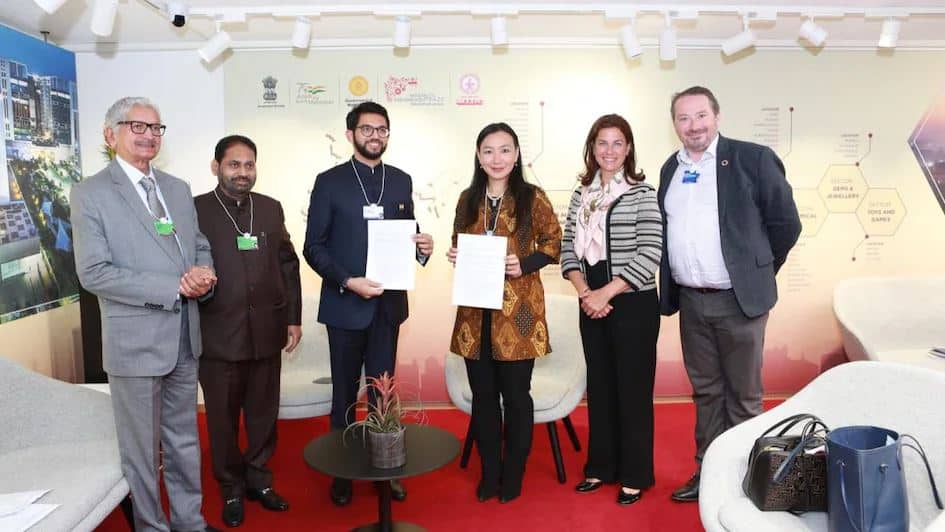By joining the WEF’s Global Plastic Action Partnership, Maharashtra aims to enhance its commitment to curbing plastic pollution, raise its ambition, and ensure accountability and inclusivity throughout the value chain.
Maharashtra on Sunday joined World Economic Forum’s Global Plastic Action Partnership (GPAP) at its Annual Meeting 2022 in Davos in order to advance regional efforts to fight plastic pollution .
“At the Maharashtra Pavilion, a Memorandum of Understanding was signed between (@MahaEnvCC and @wef on ‘Global Plastic Action Partnership’,” wrote Aaditya Thackeray, Minister of Environment and Climate Change for Maharashtra, in Marathi on Twitter.
महाराष्ट्र पॅव्हेलियन येथे @MahaEnvCC आणि @wef यांच्यात ‘ग्लोबल प्लॅस्टिक ॲक्शन पार्टनरशिप’ संदर्भात सामंजस्य करार झाला.
यामुळे @wef च्या GPAP चे सदस्य असणारे महाराष्ट्र हे पहिले राज्य सरकार झाले आहे. आम्ही मानतो की हे कृती करण्याचे दशक आहे! @CMOMaharashtra pic.twitter.com/wWkB3esGMq
— Aaditya Thackeray (@AUThackeray) May 22, 2022
By joining the Global Plastic Action Partnership, Maharashtra, which is India’s largest state in terms of GDP, aims to enhance its commitment to curbing plastic pollution, raise its ambition, and ensure accountability and inclusivity throughout the value chain.
The announcement follows the fifth United Nations Environment Assembly (UNEA 5), where a resolution was adopted in March 2022 that will hold member nations legally accountable for their contributions to the global plastic pollution crisis.
Maharashtra’s Ministry of Environment and Climate Change Maharashtra will work with GPAP to launch a National Plastic Action Partnership (NPAP) in the state as a platform to tackle plastic waste pollution. The GPAP-Maharashtra partnership is the first in India. Maharashtra has joined a growing list of global economies that will leverage the GPAP platform to drive localized solutions for the circular economy.
“This agreement with the World Economic Forum’s Global Plastic Action Partnership marks a critical juncture in our state’s battle against the plastic pollution endemic,” said Aaditya Thackeray.
“Covid proved a hurdle towards our single use plastic ban, where health priorities in PPP took precedent. Now as we refocus on our climate and sustainability objectives, we are laying the foundation to deliver the systems-wide change needed across sectors. This partnership is the building block as we transition towards a more resource circular approach to tackle climate change while strengthening our economy,” Thackeray added.
WEF explained that the NPAP model creates a circular economy framework for plastics through a locally-led, locally-driven platform. In Maharashtra, it will bring together the state’s most influential policy-makers, business leaders and civil society advocates. It added that this group will deliver a state-level action plan to radically reduce plastic pollution and connect high-potential solutions with strategic financing opportunities.
“GPAP is thrilled to partner with Maharashtra to continue their efforts to tackle the plastic pollution problem,” said Kristin Hughes, Director of the Global Plastic Action Partnership.
In March 2018, Maharashtra had banned the manufacturing, sale and use of single-use plastic bags. It also banned an array of single-use plastic products, including cutlery, straws and containers. The state has been positioning itself as a leader in India in the fight against plastic waste pollution.
Packaging 360 is a comprehensive knowledge sharing ecosystem for the Indian packaging industry. Our services include an online content platform to deliver news, insights and case studies; organising conferences seminars and customised training; Providing Bespoke Project Consulting, Market Research and Intelligence.







